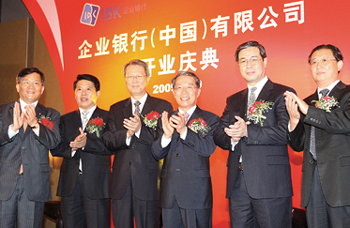IBK on a Roll in China
Bank opens wholly-owned subsidiary to take control of its operations including local currency loans
 The Industrial Bank of Korea opened a wholly-owned subsidiary in Tianjin on June 29 to oversee all of its operations in China, the bank said.
The Industrial Bank of Korea opened a wholly-owned subsidiary in Tianjin on June 29 to oversee all of its operations in China, the bank said.
The opening ceremony of the new subsidiary in took place at the Nikko Hotel in Tianjin, Shandong Province, with President Yun Yong-ro presiding over the event with some 260 Koreans and Chinese in attendance including Korean Amb. to Beijing Shin Jeong-sung and Mayor Huang Shin-guo of Tianjin leading the local dignitaries.
President Yun said IBK will now be able to operate retail banking, which has so far been restricted by local regulations through its new Chinese subsidiary, allowing personal banking transactions in China to cater to various financial needs of Korean SMEs operating in the neighboring country. IBK will now focus on expanding the operation of its new overseas subsidiary in China to be among the best foreign financial institutions catering to SMEs, Yun said at the ceremony.
The new IBK subsidiary in China has assumed the management of the five Chinese branches ¡ª Tianjin, Qingdao, Shenyang, Yentai and Tsuzhou ¡ª and will deal in local currency transactions under its license obtained in May from the Chinese financial authorities. IBK China branches have been issuing local currency loans to local clients including individuals and businesses and take their deposits in yuan.
IBK first opened its branch in Tianjin in 1997 and hasexpanded its operations to other cities since then.
Medical Service Mission:
In the meantime, the bank has decided to operate a medical service team jointly with the National Health Insurance Corp. to take care of low-income families and workers of SMEs and to donate 600 million won for the medical service team's operation, the bank said recently.
IBK President Yun and Chairman Chung Hyung-gun of the National Health Insurance Corp. signed an agreement for cooperation in the presence of Chairman Kim Deuk-rin of the Korea Social Welfare Association on July 2 at the NHIC head office in Mapo Ward, Seoul, the bank said.
The donated funds will go toward purchasing medical equipment and two buses to carry medical personnel around the country. The services will be provided free of charge even to foreign residents who live in isolated areas where medical services are not accessible and for workers on SME industrial estates around the country, the bank said.
Established under the Industrial Bank of Korea (IBK) Act in 1961, the bank shares a special relationship with the Korean government. The bank's primary objective is to "promote independent economic activities of small and medium-sized enterprises (SMEs) and to enhance their economic position in the Korean economy." Due to this public policy role, the government retains full control over the bank including the appointment of management and the approval of budgetary and operational plans of the bank.
On Dec. 11, 2003, an amendment was made to the IBK Act, giving the bank more autonomy in its operations. Among other activities, the bank was allowed to invest in the equities and debt securities of the SMEs and to set up budgeting requirements for general and administrative expenses besides labor costs. An additional amendment was made to the Articles of Incorporation of the Act on March 30, 2005, granting the bank authority to utilize more diverse sources of capital.
Due to the bank's critical role in implementing SME promotion policies, it receives the highest level of implicit and explicit support from the government. Operations are guaranteed in principle by Article 43 of the IBK Act, which states, "The Bank shall cover any net loss incurred during a particular fiscal year with its reserves and if the reserves are insufficient, the government shall provide funds to cover the deficit." As the Article stipulates, if the bank's reserves cannot cover the annual net losses incurred during operations, the Korean government is legally obligated to replenish the deficit. Furthermore, it is the only bank in Korea allowed to issue Small and Medium Industry Finance (SMIF) bonds. SMIF bonds provide the bank with a low cost funding advantage over commercial banks. The aggregate outstanding balance of SMIF bonds can be issued for to 20 times the bank's paid-in capital plus its reserves. nw
A group of dignitaries including President Yun Yong-ro ,3rd R, clap hands during a ceremony to celebrate the opening of the Industrial Bank of Korea's wholly-owned subsidiary in Tianjin, China on June 29.
3Fl, 292-47, Shindang 6-dong, Chung-gu, Seoul, Korea 100-456
Tel : 82-2-2235-6114 / Fax : 82-2-2235-0799